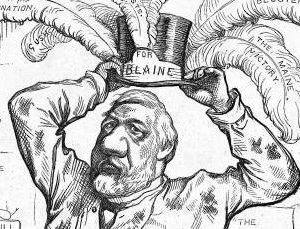Our New Hampshire Constitution is a historic document.
Adopted in 1784, there have been amendments since then — and I would like to focus on one made almost a century later. In 1877, a “no aid” or “Blaine” amendment was added. That amendment was a result of the religious bigotry of the time and is a stain on our constitution today.
From the mid-1800s into the 1900s, our country was predominately a Protestant nation, and schools were no different. Religion and reading from the Bible were part of education.
But with the immigration of Catholics from several countries — primarily from Ireland to escape the potato famine — problems arose. Immigrant parents found that their children were being taught religious concepts contrary to their own. Catholic and Jewish schools were established. This led to a period of religious discrimination and even violence.
“Catholic students suffered beatings or expulsions for refusing to read from the Protestant Bible, and crowds… rioted over whether Catholic children could be released from the classroom during Bible reading,” according to an article in the Michigan Law Review. Even before the Civil War, anti-Catholic riots had broken out in Maine and a Catholic Church in Bath was burned.
After the war, President Ulysses S. Grant gave a speech calling for a constitutional amendment to forbid states from providing public funds to any school that taught “sectarian (aka Catholic) tenants.”
Rep. James Blaine of Maine was the speaker of the House and a friend of President Grant. Blaine envisioned himself to be the successor to Grant.
Soon after the Grant speech, Blaine introduced a constitutional amendment providing that no state raised tax funds be provided to any religious “sect.” That amendment passed the U.S. House but fell just short of the necessary two-thirds votes in the Senate.
But the anti-Catholic movement did not end there. Our state was not exempt from this anti-Catholic rhetoric. New Hampshire’s U.S. Sen. Henry William Blair was a proponent of teaching religion in schools — Protestant religion. He even proposed that every subsequent state added to the union be required to have an amendment in their constitution to prevent public money going to “sectarian” schools.
States began adopting their own “Blaine” type amendments. One of the groups supporting these amendments was the Ku Klux Klan.
New Hampshire was no different.
In 1877, New Hampshire added a “Blaine” amendment to Part 2, Article 83 of our constitution. It is clearly modeled after the failed U.S. constitutional amendment to extend the anti-religious, anti-Catholic prohibitions.
Why should this relic of an anti-religious period remain in our constitution?
This question is even more relevant now after the U.S. Supreme Court ruled in the Espinoza vs. Montana Department of Revenue case that these state “Blaine” amendments violate the Free Exercise clause of our First Amendment.
The Montana amendment was used as the basis for not allowing a family to use their children’s tax credit scholarship to go to a religious school. It was fine to go to any other private school, just not a religious one. As Chief Justice Roberts stated in the Supreme Court’s majority opinion, the state “cannot disqualify some private schools solely because they are religious.”
I have introduced a constitutional amendment to repeal our N.H. “Blaine” amendment that will be heard in our Legislature next year. If passed by both chambers of our Legislature (by a 3-to-5 vote) it will go to you, the voters, for your say. I have also initiated a website about related court decisions and the history of Blaine amendments — www.RepealNHBlaine.com. There are articles about the Espinoza case, more on Blaine amendments and podcasts.
Blaine amendments were born of bigotry. New Hampshire needs to repeal this now-unconstitutional remnant of anti-religious, anti-Catholic bigotry. This should not be a political issue. The Blaine amendment repeal should bring us together to eliminate this remnant of religious bigotry.
Rep. Glenn Cordelli (R-Tuftonboro) is a member of the House Education Committee.

